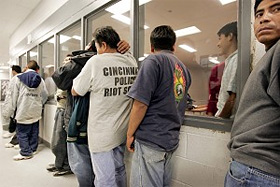 |
 |
 |
 Health & Beauty | January 2006 Health & Beauty | January 2006  
Hispanic Migrants Face Emotional Struggles
 HealthDay HealthDay


| | Mexican migrants are processed at the United States Border Patrol detention center after being captured entering the U.S. illegally earlier this year in Nogales, Arizona. (Getty Images) |
Ambivalence about moving to the United States may contribute to poor mental health in male farm workers from Mexico and Central America.

That's the conclusion of a Wake Forest University School of Medicine study of 60 Hispanic migrant farm workers in North Carolina.

These men often face competing desires, the researchers noted. They want to remain with their families in their homelands but realize that migrating to the United States offers the promise of a better future. This results in feelings of ambivalence that may cause mental health problems, such as depression and anxiety.

"The consequences of poor mental health are serious. Farm work can be a hazardous environment and if workers have anxiety or depression, they may fail to take appropriate precautions to prevent occupational health injuries," researcher Joseph G. Grywacz, an assistant professor of family medicine, said in a prepared statement.

He and his colleagues found that 75 percent of the migrant farm workers reported ambivalence about leaving their wives and children and 66 percent were torn about leaving their parents. Each type of ambivalence was associated with more symptoms of anxiety, compared to men who expressed no ambivalence about coming to work in the United States.

"Family ambivalence inherent in migration is associated with poorer mental health among Latino men. We found that the anxiety can be exacerbated when they are unable to call relatives in Mexico frequently," Grywacz said.

He suggested that agencies and people who deal with migrant workers should do more to help the workers communicate with their families back home.

The study was published in the Journal of Immigrant Health.

Previous research found that about 25 percent of Mexican immigrants to the United States have mental health problems, such as depression or anxiety, during their lifetimes. Common explanations for poor mental health among immigrants include the clash of cultures and the physical and emotional demands of immigration, the researchers said. | 
 | |
 |



